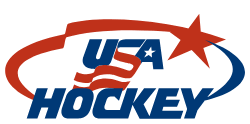By Mike Doyle, 09/13/24, 12:30PM MDT
An Informed Parent Is an Ally

The start of hockey season is brimming with opportunity and excitement. It is also an opportunity for coaches and parents to get on the same page with a preseason meeting.
“An informed parent is an ally,” said Ken Martel, USA Hockey Senior Director of Player & Coach Development. “They want to be on your side. They want to do things that are going to be good for the kids.”
First Impressions
Along with introducing yourself and staff, the preseason meeting is the first opportunity for coaches to discuss their approach and vision.
“Who is going to be working with your children?” Martel said. “Informing them a little bit about who you are and what your coaching philosophies are.”
Martel also encourages coaches to ask parents what they would like to see their child get out of the season as well.
“A lot of them are going to be generic around – want them to have fun, want them to learn teamwork, I’d like them to improve,” Martel said. “Giving the parents a little bit and asking them those things, they are going to be general and align with what the coach is probably already thinking.”
This gives coaches an opportunity to align their vision with the parents so there is an understanding right off the bat.
“The coach might actually have a more detailed outline in their own head of where they’re going to go and the process, but getting the parents to say, ‘Yes, I want those things too,’” he said. “There’s a chance for some mutual agreement so they know you care about the same things they do.”
Setting Expectations
This is a good time to set clear expectations.
“Matching expectations is probably the goal of what you are trying to do [in a parent meeting],” Martel said. “Having parents understand what the communication process is going to be. What the expectations on behavior are going to be. Are there expectations the local association has beyond just the coach.”
One example Martel gives is the way he expects coaches, players and parents alike, to treat the referees.
“Myself as a coach, I want get to a point where I’m never going to yell at the referee for a bad call. I expect our parents to do the same,” he said. “Bad calls are going to happen, so the kids don’t need me wound up because that will detract from their play. And they don’t need you wound up. So, it’s an example of expectations of how we’re going to behave together.”
Team rules, ice time expectations and boundaries can also be established. From what time you want kids to arrive at the rink before games to parent-coach communication. Some coaches implement a 24-hour rule after games to receive communication from parents.
Depending on the age of the player, Martel encourages players to try and resolve any issues first before parent involvement.
“If you have a concern or your child has a concern, why don’t you ask your child to see if they can broach it. We’re trying to develop our children beyond the ice rink. If your child is unhappy, have them come talk to me,” Martel said. “Let’s see if we can help them develop their communication skills. And I encourage the parents to sit in on any communication you have with the kid because they’re minors.”
Many hockey associations have a code of conduct for coaches and parents.
And then there’s logistics. How often will the team practice and play games? If you are on a team that will travel, how many tournaments do you plan on going to?
“Travel for tournaments is an added expense that maybe some families might not want,” Martel said. “Those are decisions that aren’t just made by the coach, those are decided by the families. So scheduling things need to be accounted for.”
Continued Communication
One meeting is not enough.
“It shouldn’t be just a parent meeting at the beginning of the season. Regular touch points are important – whether that is through emails or a meeting every so often – of how are you going to communicate to the families,” Martel said. “Be informative as you can, set expectations and get everybody on the same page. So everything is out front initially and then you have something to refer back to.”
Communication is key to having a good coach-parent-player relationship. It’s better to be over communicative than not enough. Otherwise, parents might not get the full story and start to fill in the gaps with their own conjectures.
“It’s an exciting time of the year. As a coach, you haven’t screwed up yet, everybody is still happy with you,” Martel laughed. “But understand there are always issues through a season. When issues come up, be proactive and try and communicate ahead of time. But give parents the information they need so they are not guessing about things.”



